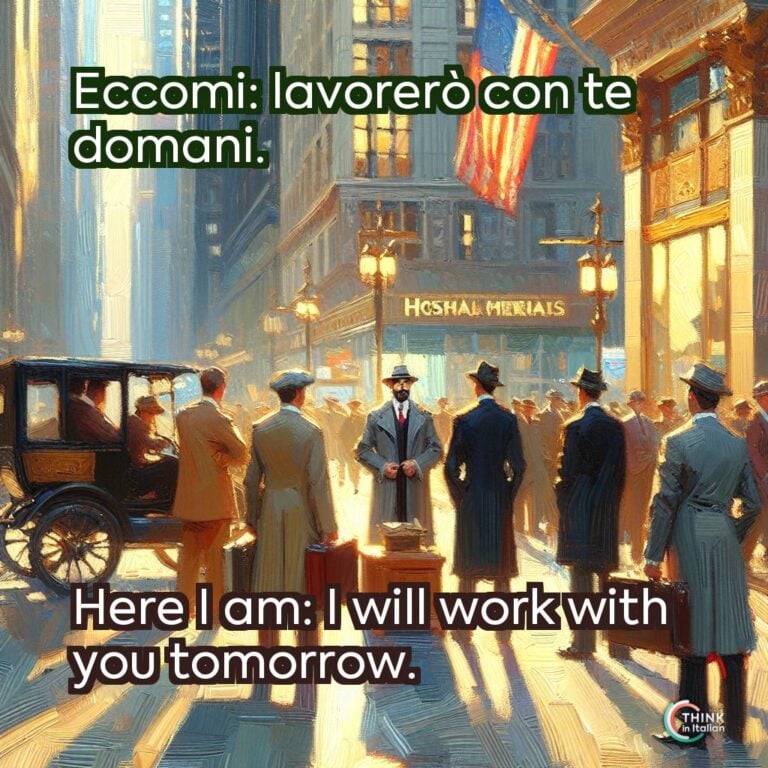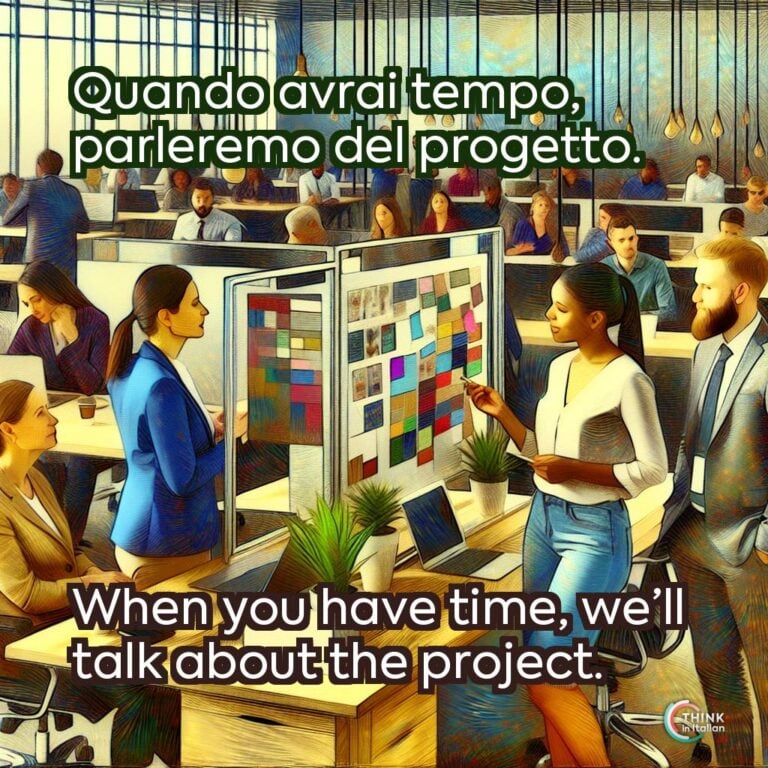The Future Tense in Italian
The future tense in Italian, known as futuro, is similar to the English will + verb (I will eat) and is used to talk about actions that, of course, will happen in the future.
It has two tenses: futuro semplice (simple future) and futuro anteriore (future perfect). Here, I will focus on the simple future only, specifically on regular verbs. But there are other articles dedicated to the future of irregular verbs and the future perfect, so go check them out!
Regular Simple Future in Italian
Conjugation
Forming the simple future in Italian is relatively easy: as with all verb conjugations, you have to drop the ending of the infinitive (-are, –ere, –ire) and add those of the corresponding tense.
In the case of the Italian simple future, these endings are composed of:
- thematic vowel (-are-> e; –ere-> e; –ire-> i)
- r
- conjugation
Sounds familiar? Yes, it is the same as the present conditional, but conjugated ending change of course! Let me show you what I mean with the verb cantare (to speak).
First, we get rid of the ending of the infinitive and obtain cant-. This is a first conjugation verb, therefore we add the thematic vowel e, and obtain cant–e. Then, we add the r and obtain cant–e–r, and finally we attach the endings that are specific for the futuro semplice, as follows:
| io | -ò |
| tu | -ai |
| lui/lei | -à |
| noi | -emo |
| voi | -ete |
| loro | -anno |
Therefore, if you want to say that you will sing a song, you can say Io canterò una canzone.
As I said, it is not that hard, but if you feel it is tricky at the beginning, I’ll give you good news: the endings are the same for all three verb conjugations! Feel relieved?
Here I created three tables so that you can see how regular verbs work:
- -are as in parlare (to talk)
| Io parlerò | I will talk |
| Tu parlerai | You will talk |
| Lui/lei parlerà | He/she will talk |
| Noi parleremo | We will talk |
| Voi parlerete | You will talk |
| Loro parleranno | They will talk |
- -ere as in credere (to think)
| Io crederò | I will think |
| Tu crederai | You will think |
| Lui/lei crederà | He/she will think |
| Noi crederemo | We will think |
| Voi crederete | You will think |
| Loro crederanno | They will think |
- -ire as in sentire (to feel)
| Io sentirò | I will feel |
| Tu sentirai | You will feel |
| Lui/lei sentirà | He/she will feel |
| Noi sentiremo | We will feel |
| Voi sentirete | You will feel |
| Loro sentiranno | They will feel |
When to use Futuro Semplice
In Italian, we use the simple future in the following cases:
- To indicate an action or event that will occur in the future:
L’anno prossimo mi trasferirò in Italia.
Next year I will move to Italy.
- To predict a future event:
Secondo me, nevicherà domani.
I think it will snow tomorrow.
- To express a spontaneous decision:
Ok, gli scriverò!
Alright, I am going to text him!
- To hypothesize about the future:
Se piove, rimarremo in casa.
If it rains, we will stay indoors.
- In specific circumstances, we use the future to make assumptions:
Non trovo il telefono. Sarà a casa.
I can’t find my phone. It might be home.
Other Types of Future
As you might have seen, the Italian simple future can be translated into different types of future tense in English. This is because English, unlike Italian, classifies future based on other characteristics as well, like intention and certainty that a future even will take place.
However, also the Italian language has other ways to express the future. For instance, we can use the present tense to talk about the future, especially when we are sure of what will happen in the future.
Domani vado al mercato, vieni con me?
Tomorrow I am going to the market, are you coming with me?
Another way we can express the future in Italian is with the expression stare per + infinitive. Specifically, this translates in “to be about to”, therefore it is used to talk about actions that will happen in the very recent future.
Sposta il libro, sta per cadere.
Move the book, it is about to fall.
Ready to Make Predictions
Imparerari l’Italiano velocemente! (You will learn Italian fast!)
If you keep studying, I am sure this will happen! You are a step further in your Italian learning journey: I have just embarked the world of the future events. You can now make predictions, hypotheses, and even assumptions.
So, practice the use of this verb tense and unlock new topics and conversations!




